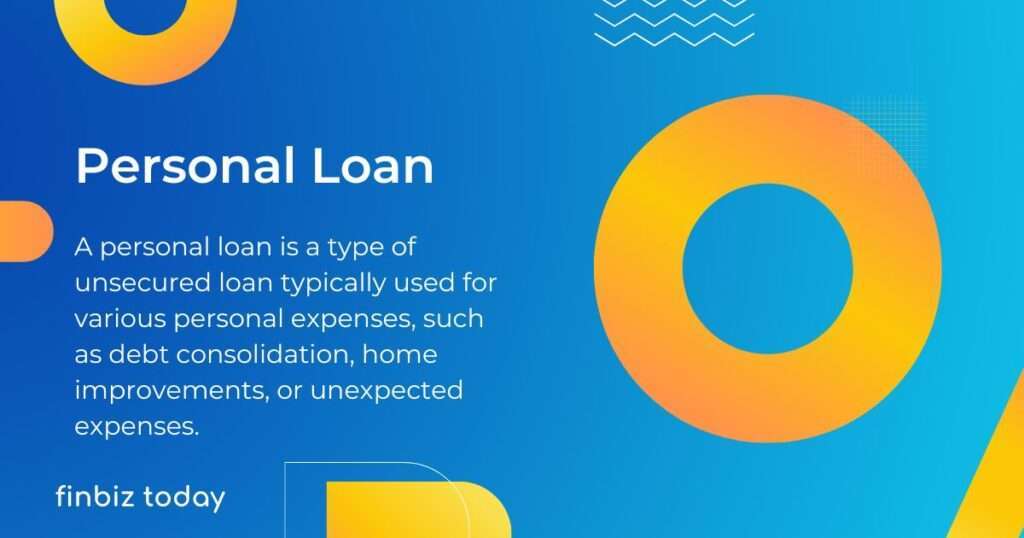In today’s financial landscape, personal loans have become a popular option for individuals seeking to bridge financial gaps or achieve various financial goals. But what exactly is a personal loan, and how does it function? A personal loan is a type of installment loan provided by financial institutions, such as banks, credit unions, or online lenders, that allows borrowers to access a lump sum of money upfront. This amount is typically repaid over a fixed term in regular installments, along with interest, until the loan is fully paid off. Now, let’s delve deeper into some common questions surrounding personal loans:

What is a Personal Loan and How does it Work?
A personal loan is a financial product that enables individuals to borrow a specific amount of money from a lender, with the agreement to repay it over time with interest. Personal loans offer flexibility and can serve multiple purposes, including debt consolidation, medical bill payments, home renovations, or major purchases.
Example of a Personal Loan
An example of a personal loan could be borrowing a sum of money from a financial institution to cover expenses like home renovations, consolidating high-interest debts, funding a wedding, or covering unexpected medical bills. These loans typically offer fixed or variable interest rates and have repayment terms ranging from a few months to several years.
Is Personal Loan Good to Take?
Whether a personal loan is a good option depends on your financial circumstances and goals. Personal loans can be beneficial for consolidating debt, covering emergencies, or financing major purchases. However, it’s essential to consider factors such as interest rates, fees, and repayment terms before taking out a loan. Evaluate your ability to repay the loan and explore alternatives like improving your credit score or negotiating with creditors before committing to a personal loan.
How to get Personal Loan?
Obtaining a personal loan typically involves the following steps:
Research and Compare: Evaluate various lenders and loan offers to find the best terms and rates suited to your needs.
Check Eligibility: Review the lender’s eligibility criteria, which may include factors such as credit score, income, employment history, and debt-to-income ratio.
Submit Application: Complete the lender’s application process, providing necessary documentation and personal information.
Review Loan Terms: Once approved, carefully review the loan terms, including interest rate, repayment schedule, and any associated fees.
Accept Loan Offer: If satisfied with the terms, accept the loan offer and proceed with the disbursement of funds.
Types of Personal Loans
Personal loans come in various forms to accommodate different borrowing needs:
Secured Personal Loans: These loans are backed by collateral, such as a vehicle or savings account, which can result in lower interest rates.
Unsecured Personal Loans: Unlike secured loans, unsecured personal loans do not require collateral but may have higher interest rates.
Fixed-Rate Personal Loans: With fixed-rate loans, the interest rate remains constant throughout the loan term, offering predictable monthly payments.
Variable-Rate Personal Loans: Variable-rate loans feature interest rates that fluctuate based on market conditions, potentially resulting in lower initial rates but higher risk.
How does a Personal Loan Work from a Bank?
When you apply for a personal loan from a bank, you’ll typically undergo a thorough application process that includes providing personal and financial information, such as your income, employment history, credit score, and debt obligations. The bank will assess your creditworthiness and may require collateral for larger loan amounts or offer unsecured loans based on your credit profile. If approved, you’ll receive the loan amount in a lump sum, and you’ll be required to make regular payments, including principal and interest, according to the agreed-upon terms.
Interest Rate of Personal Loan
The interest rate of a personal loan can vary depending on several factors, including your credit score, income, loan amount, repayment term, and the lender’s policies. Personal loan interest rates can be fixed, meaning they remain constant throughout the loan term, or variable, meaning they fluctuate based on market conditions. Generally, borrowers with higher credit scores and stable incomes may qualify for lower interest rates, while those with lower credit scores may face higher rates to offset the perceived risk.
Challenges in Obtaining a Personal Loan
The difficulty of obtaining a personal loan depends on various factors, including your creditworthiness, income, employment stability, debt-to-income ratio, and the lender’s requirements. Borrowers with excellent credit scores, stable incomes, and a low debt burden may find it easier to qualify for personal loans with favorable terms and lower interest rates. Conversely, individuals with poor credit histories or unstable finances may face challenges securing a loan or may be offered less favorable terms.
What type of Loan is Best for Personal Loan?
The best type of personal loan depends on your specific needs and financial situation. Secured personal loans, which require collateral, may offer lower interest rates but carry the risk of losing the collateral if you default on the loan. Conversely, unsecured personal loans don’t necessitate collateral but might entail higher interest rates. Fixed-rate loans provide predictable monthly payments, while variable-rate loans offer the potential for lower initial rates but carry the risk of rate fluctuations. Consider factors such as loan amounts, repayment terms, interest rates, and fees to determine the best type of loan for your circumstances.
What are the Easiest Sources to obtain Personal Loans From?
The ease of obtaining a personal loan can vary depending on factors such as creditworthiness, income, and the lender’s requirements. While traditional banks and credit unions offer personal loans, online lenders have emerged as convenient alternatives, often providing streamlined application processes and quicker approvals. Additionally, borrowers with strong credit histories may have an easier time securing favorable loan terms and rates.
Conclusion
In conclusion, personal loans can serve as valuable financial tools for individuals seeking to achieve their goals or navigate unforeseen expenses. However, it’s essential to assess your financial situation carefully, compare loan options, and borrow responsibly to ensure a positive borrowing experience.

